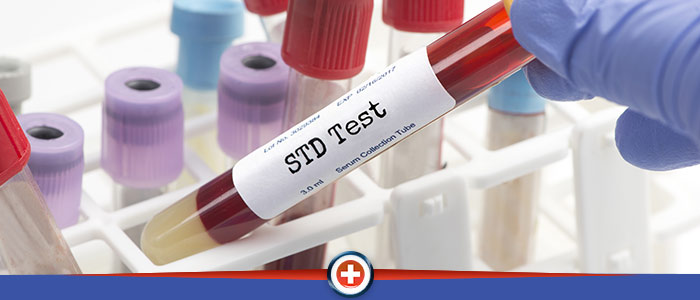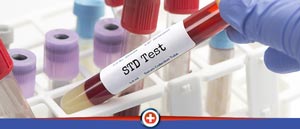Confidential STD Blood Testing Clinic in Cincinnati, OH
Some people choose not to have STI tested because they find getting a genital swab uncomfortable or embarrassing. But these days, a lot of STIs, like genital herpes, HIV, syphilis, and hepatitis B, may be identified by blood tests. However, a swab is needed for the identification of certain STIs, such as trichomoniasis, gonorrhea, and chlamydia. For more information, contact us or book an appointment. You can also visit us online to get directions to our clinic. We are conveniently located at 872 Ohio Pike, Cincinnati, OH 45245.




Table of Contents:
How soon do STD symptoms appear?
What STD can be detected by blood test?
How accurate are blood tests for STDs?
When do STDs show up on blood tests?
Blood tests are one method of STD detection that is the most accurate for certain STDs. However, if you believe you have contracted an STD, a healthcare provider will recommend a specific type of test or multiple tests depending on which STDS for which you are at an increased risk.
Symptoms of an STD can appear within a few days or a few weeks after contraction, but there are also many cases where the symptoms don’t develop until months or years later. It is also possible that the symptoms never really display because the disease is lying dormant in the body, often leading to patients remaining undiagnosed and putting them at risk for long-term complications. The types of STDs that can have periods of latency include HIV, HSV (herpes simplex virus), chlamydia, hepatitis C, and syphilis. The rate at which symptoms display can vary from person to person but will also heavily depend on the type of STD.
Since there is such a variance with how soon symptoms will develop, and if they will develop, it is highly recommended that individuals who engage in sexual intercourse with a new partner or who have not worn a condom during intercourse with their partner receive an STD panel. You will also want to let your health care provider know the date of possible contraction for the STD as it is possible that if you are tested too recently after contraction, the test will not be able to detect the virus.
There are several different types of tests available to detect the different types of STDs, including blood tests, urine samples, swabs of the mouth or genitals, and sometimes a physical examination. Different STDs can be detected through different tests, with those that can be detected through a blood test including genital herpes, syphilis, hepatitis B, and HIV. Genital herpes and syphilis can also be detected through a blood test, and HIV may also be detected through a urine test or a saliva test.
The accuracy of a blood test for STDs is highly dependent on several factors, the most significant of which includes which STDs are being tested for, as blood tests can only provide accurate information about some of the STDs. A healthcare provider will only recommend that you receive a blood test if they are checking for a specific STD and will likely recommend other methods of testing in cases where those tests are likely to be more accurate. Another influencing factor in the accuracy of blood tests for STDs is if the test is completed outside of the “window period”, which is the time between which the STD has been contracted and the time for which the STD will show up on tests.
If a blood test is performed too soon following the contracting of the STD, a wrong result is more likely. To ensure that the “window period” has passed, it is typically recommended that the blood test is performed a few weeks after the possible contracting of the STD. If the blood test is performed after the “window period” has passed, it is an incredibly reliable method of detecting STDs. For example, about 95% of antibody tests performed to detect HIV will be accurate after just 3 weeks but will be as accurate as possible when performed 6 weeks to 3 months following the potential contraction time.
The timeline upon which specific STDs will show up on blood tests varies depending on which STD is being detected. HIV is an example of an STD that can be detected a bit sooner than other types through a blood test, typically starting to likely show up on blood tests 3 weeks after exposure to the virus but can take up to 3 months to achieve accurate test results. Syphilis will often not be detectable through a blood test until at least 3 months after exposure to the disease. Hepatitis can be accurately detected through a blood test within 5 to 10 weeks after exposure.
If you want to test for multiple types of STDs, it will likely be recommended that you wait for about 3 months following the exposure to achieve as accurate of results as possible, although it is recommended you consult with a healthcare provider if you are concerned about an exposure to determine when will be the best time and method for testing. To see a healthcare professional at Eastside Urgent Care, book an appointment online or simply walk in! We are conveniently located at 872 Ohio Pike Cincinnati, OH 45245. We serve patients from Cincinnati OH, Covedale OH, Delhi OH, St Bernard OH, Wilders KY, and Elmwood Place OH.

Additional Services You May Need
▸ Asthma
▸ Bronchitis
▸ DOT Physical
▸ Employment Drug Screen
▸ Illness
▸ Injury
▸ Insect and Animal Bites
▸ Occupational Medicine
▸ Pediatric Visit
▸ Pre-OP Physical
▸ School & Sports Physicals
▸ STD And Treatment
▸ Rash/Allergic Reaction
▸ Stomach Flu Treatment

Additional Services You May Need
▸ Asthma
▸ Bronchitis
▸ DOT Physical
▸ Employment Drug Screen
▸ Illness
▸ Injury
▸ Insect and Animal Bites
▸ Occupational Medicine
▸ Pediatric Visit
▸ Pre-OP Physical
▸ School & Sports Physicals
▸ STD And Treatment
▸ Rash/Allergic Reaction
▸ Stomach Flu Treatment



